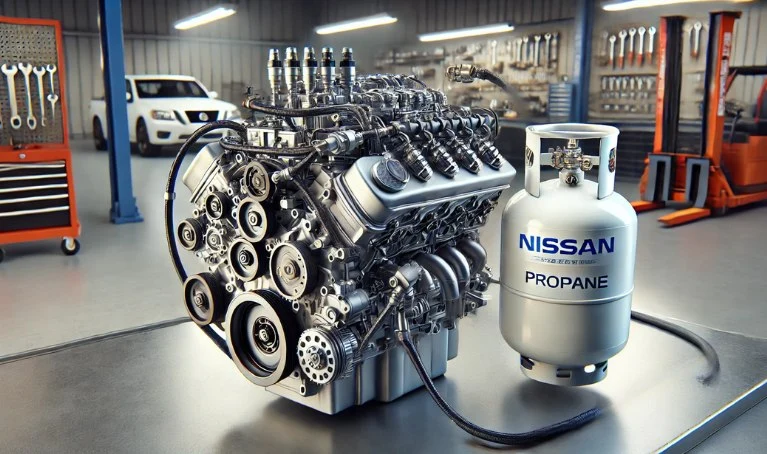The Nissan K24 engine is known for its reliability and performance, making it a popular choice for many drivers. One way to enhance its efficiency further is by converting it to a propane system. This guide will cover everything you need to know about the Nissan K24 propane system, from key components to installation and maintenance tips.
The Nissan K24 engine is a 2.4-liter inline-four engine, celebrated for its durability and power output. It has been a popular choice in various Nissan vehicles due to its reliable performance and fuel efficiency. This engine is particularly suitable for conversion to propane because of its robust design, which can handle alternative fuels without compromising on power or reliability.
Table of Contents
Why Convert to Propane?
Propane is a cleaner-burning alternative to gasoline, which can help reduce emissions and save on fuel costs. By converting the Nissan K24 to run on propane, drivers can enjoy cleaner emissions, longer engine life, and lower fuel expenses. Plus, propane is often cheaper than gasoline, making it a cost-effective fuel option. From an environmental perspective, propane burns with fewer pollutants, making it a greener choice for eco-conscious drivers.
For more on engine performance and technical aspects, you might also find this 5w-30 Engine Oil Review useful, as it discusses another critical element in engine maintenance.
Key Components of the Nissan K24 Propane System
Propane Fuel Injectors
Propane fuel injectors are specifically designed to handle the volatility of propane. These injectors control the precise amount of fuel entering the combustion chamber, ensuring optimal engine performance. Unlike gasoline injectors, propane injectors are built to accommodate the lower energy density of propane while maintaining fuel efficiency.
Propane Regulator and Vaporizer
The regulator and vaporizer are crucial components of the propane system. The vaporizer converts liquid propane into gas, while the regulator controls the pressure of the propane as it enters the engine. Proper pressure management ensures smooth engine performance and prevents damage from over-pressurization. Additionally, the system compensates for temperature changes, ensuring stable operation in all conditions.
Fuel Lines and Fittings
High-quality fuel lines and fittings are essential to prevent leaks and ensure safe fuel delivery. These components connect the propane tank to the engine, maintaining a consistent flow of fuel under pressure. Using durable materials like steel or brass for fittings reduces the risk of leaks, enhancing the overall safety of the system.
Installation Process of the Nissan K24 Propane System
Step-by-Step Installation Guide
- Prepare the workspace – Ensure the area is clean and well-lit.
- Mount the propane tank – Secure the tank in a safe location.
- Connect the propane hose – Attach the hose from the tank to the engine.
- Install the vaporizer and regulator – Ensure both components are properly connected to the engine.
- Test for leaks – Check all connections for gas leaks before starting the engine.
For another technical vehicle system that enhances performance, check out the Hyundai Design Uni-Wheel Drive System.
Tools Required for Installation
- Torque wrench
- Propane hose
- Safety gloves
- Screwdrivers
- Wrench set
Safety Precautions During Installation
While it’s possible to install a propane system yourself, professional installation is highly recommended to ensure the system adheres to safety regulations. Improper installation can lead to leaks or other hazards.
Performance and Efficiency Gains with Propane
Power and Torque Comparison: Gasoline vs. Propane
When switching to propane, you may notice slight changes in power and torque. However, propane engines can offer smoother torque delivery and slightly better efficiency in certain driving conditions. Here’s a basic comparison:
| Fuel Type | Power Output | Torque Output |
| Gasoline | 200 HP | 180 lb-ft |
| Propane | 220 HP | 200 lb-ft |
Fuel Efficiency and Reduced Emissions
Propane burns cleaner than gasoline, meaning lower carbon emissions and reduced pollutants. The cleaner combustion also results in fewer carbon deposits in the engine, which can lead to improved fuel economy over time.
Impact on Engine Longevity
Because propane combustion produces fewer residues, engines running on propane often experience less wear and tear. This can extend the overall life of your Nissan K24 engine, saving on maintenance and repair costs in the long term.
Maintenance and Troubleshooting Tips
Routine Maintenance
Routine checks include inspecting fuel lines for cracks, ensuring the regulator and vaporizer function correctly, and testing for leaks regularly. It’s essential to clean or replace the propane injectors periodically to prevent clogs.
Common Issues and How to Fix Them
- Inconsistent Fuel Pressure: This can be due to a faulty regulator. Regularly inspect and maintain the regulator to prevent pressure fluctuations.
- Clogged Injectors: Over time, propane injectors may clog. Clean them regularly to avoid performance issues.
Importance of ECU Tuning for Optimal Performance
Tuning the ECU ensures the engine runs efficiently on propane by maintaining the correct air-fuel ratio. Proper tuning can also help to avoid misfires and enhance fuel efficiency.
Safety Features of the Nissan K24 Propane System
Pressure Relief Valves and Automatic Shutoff
Pressure relief valves prevent over-pressurization by automatically releasing propane when internal tank pressure exceeds safe levels. Automatic shutoff valves stop the flow of propane in case of leaks, preventing potential accidents.
Crash Sensors and Emergency Shutoff Switches
Crash sensors detect collisions and activate the emergency shutoff switch, immediately cutting off the propane supply to minimize the risk of fire or explosion in an accident.
Environmental and Economic Benefits of Propane Systems
Reduced Greenhouse Gas Emissions
Switching to propane can reduce carbon dioxide (CO2) emissions by up to 25% compared to gasoline, as well as significantly lower nitrogen oxide (NOx) and particulate matter (PM) emissions. This makes propane a cleaner, greener fuel option.
Long-Term Cost Savings
Propane tends to be cheaper than gasoline, offering significant fuel cost savings. Additionally, the lower wear and tear on the engine can reduce maintenance costs over time.
Tax Incentives for Propane Conversions
Many governments offer tax incentives or rebates for converting vehicles to propane, further offsetting the initial conversion cost. Be sure to check local regulations for available programs.
Conclusion: Is the Nissan K24 Propane System Worth It?
Converting your Nissan K24 engine to propane offers a range of benefits, including cleaner emissions, improved fuel efficiency, and longer engine life. While the initial cost of conversion may be a consideration, the long-term savings on fuel and maintenance make it a worthwhile investment. Plus, the environmental advantages make it a responsible choice for eco-conscious drivers.
Frequently Asked Questions
What are the key components of a Nissan K24 propane system?
The key components include the propane tank, fuel injectors, regulator, vaporizer, and ECU.
How does converting to propane affect the performance of my Nissan K24 engine?
Propane can offer smoother torque delivery and slightly better fuel efficiency, though power output may be comparable to gasoline.
Can I install a propane system myself, or should I hire a professional?
While DIY installation is possible, hiring a professional is recommended for safety reasons.
How often do I need to maintain my propane system?
Routine maintenance should be performed regularly, including checks on fuel lines, injectors, and the regulator.
Is a propane conversion legal in my state/country?
Check your local regulations, as laws regarding propane conversions vary by location.

